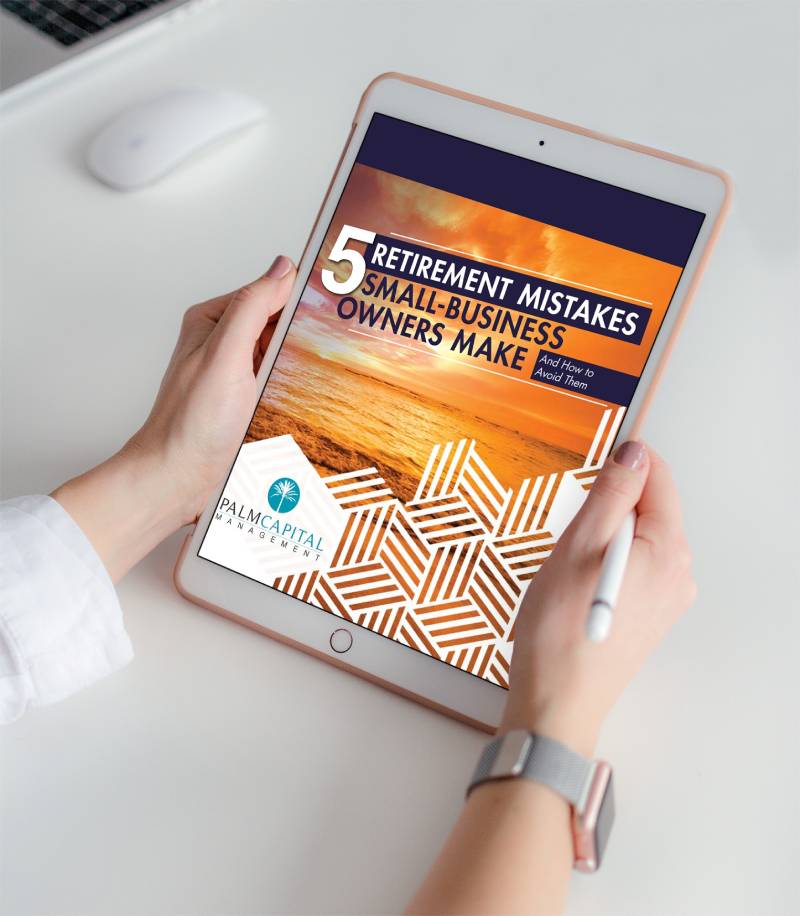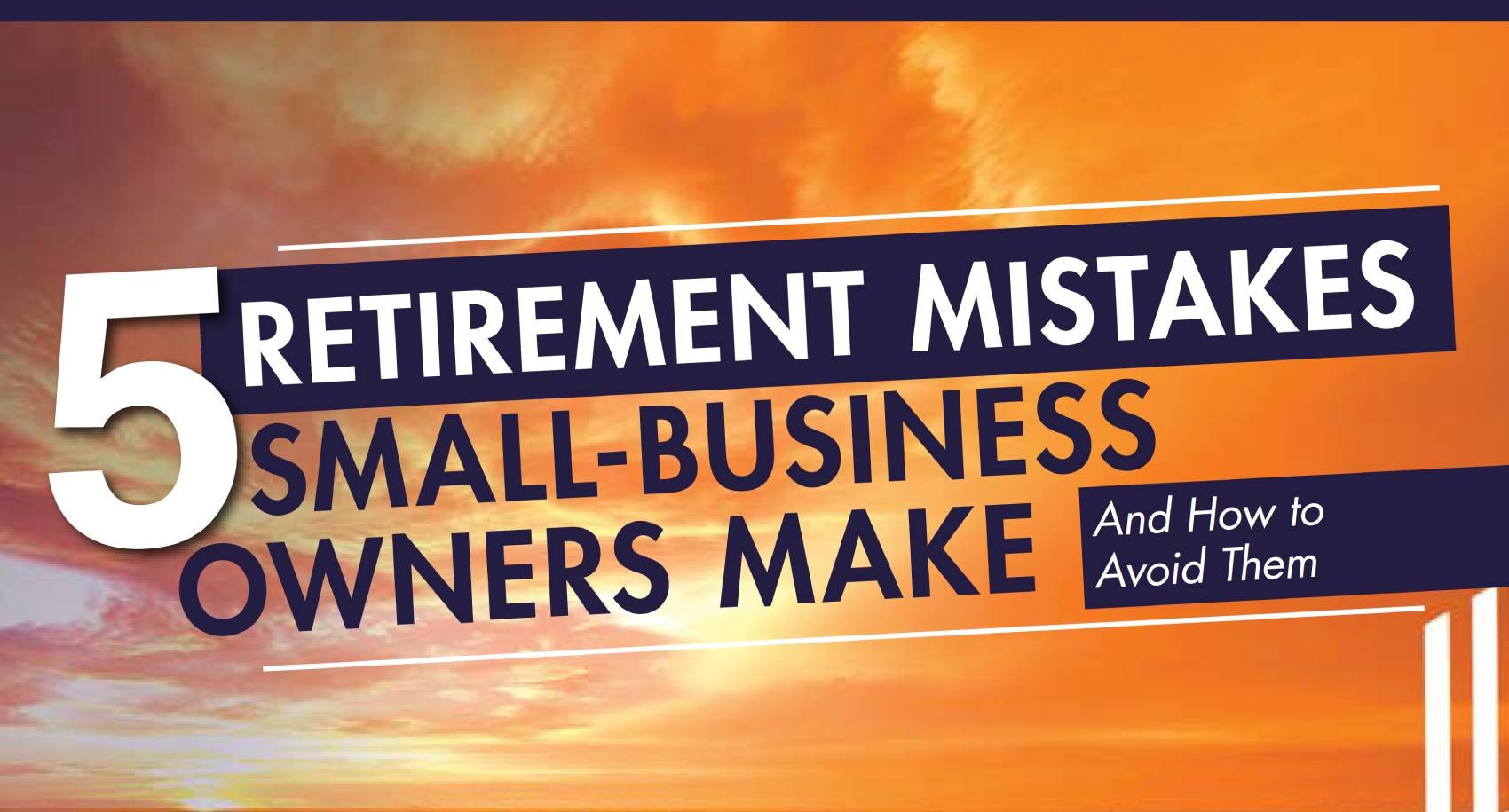As a business owner, you face unique challenges and opportunities when building your financial future. This special report provides insights on mistakes to avoid and steps to take for building the retirement you desire—while managing your myriad responsibilities.
Small-business owners are an essential component of keeping America’s economy churning. In the United States, small businesses with 500 or fewer employees make up 99.7% of companies.1
Too often, however, small-business owners spend so much time and energy building their companies, they neglect their personal financial futures. They might consider their companies to be their retirement plans but don’t create the structure or strategy necessary for turning financial success into a meaningful retirement.
With this report, our goal is to help business owners avoid costly mistakes and confidently plan for the retirement they deserve.
Mistake #1
Not Creating a Retirement Roadmap
A third of small business owners don’t have retirement strategies in place.2
Building, running, and growing a company is tough. Business owners have countless responsibilities and too few hours in the day. Often, in the midst of fulfilling your professional priorities, you end up putting your personal financial life on the back burner.
If you have not planned for your retirement, you are not alone. Many entrepreneurs think growing a business is all they need to retire. However, simply having a business does not automatically mean you have a retirement strategy in place. Without a documented road map—one that goes beyond the hope to sell your business or to pass it to family—you could end up pushing back your ability to retire. In one survey, 37% of respondents said they have no retirement strategy, while 12% have no plans to
retire, both of which are likely short-sighted.3
Delaying retirement is not always an option, though. Life often brings surprises and challenges, and you cannot always control when you retire. You may retire early because of challenges, such as health problems or disability. In 2018, only 26% of retirees were very confident in their abilities to cover medical expenses during retirement.4 To help ensure you can experience retirement on your terms—rather than reacting to what life or the business world throws your way—you need to proactively address these items…today.
What to do now:
Mistake #2
Not Having an Exit Strategy
Only 30% of US businesses survive to the 2nd generation—and 12% to the 3rd generation.5
For many business owners, the idea of selling their companies for top dollar or passing them down to future generations is a retirement dream. Many entrepreneurs, though, are not doing the work necessary to turn this dream into a reality.
In the United States, 50% of business owners plan to leave in the next decade. However, less than 30% has a business succession plan.6 A third of business owners plan on a retirement somewhere between their mid-fifties and mid-sixties.7
No matter how long you want to work and how much you love your business, a clear exit strategy is necessary to help foster the company’s longevity and preserve your financial health. If you want to be able to retire when and how you would like—and have your business last beyond your career—you need an exit strategy for accomplishing that goal.
What to do now:
Mistake #3
Not Having Separate Retirement Savings
In one survey of entrepreneurs, 75% had saved “$100,000 or less” in retirement accounts.8
Trying to build retirement savings while you foster your business can be challenging. With only so many dollars to go around, and an endless list of professional expenses, you might rather reinvest in your company. However, even if you are ready to sell your business at retirement, you need to have savings that are completely separate from your business.
The reality is that solely relying on the value of your business to carry you into retirement is a risky approach that can easily backfire. Not only can industries change and companies falter, but many baby boomers are selling their businesses right now, which could potentially make a sale tougher in some markets.9 Would you and your family be able to enjoy a comfortable retirement without your current income or profits from selling your business? If the answer is no, now is the time to start building your savings.
What to do now:
Mistake #4
Not Having Sufficient Life Insurance Coverage
Only 47% of small companies have any type of business life insurance.10
Most people are familiar with life insurance, but the role this product plays for small-business owners often is more complex than for the typical individual. Of course, sufficient life insurance can help protect your family’s financial security if you were to pass away. A business owner, though, could have an extra liability: business collateral. If you take out loans to support your business using personal assets as collateral and you pass away, your family members may be on the hook for that debt, which could jeopardize their financial standing. However, life insurance provides an added layer of protection for your loved ones.11
What to do now:
*Guarantees are based on the claims-paying ability of the issuing company. Life insurance coverage may be subject to underwriting and is not guaranteed. Premium costs and benefits will vary.
Mistake #5
Not Hiring Outside Support
Nearly 80% of small business owners are solely responsible for coping with all regulatory information.12
Running a successful small business requires a number of skills—from delivering your product or service to managing employees and growth. Accustomed to shouldering a vast number of responsibilities, many business owners seem to forget they do not have to go it alone.
Hiring outside help not only gives you access to experienced professionals who can apply their expertise to your specific needs, but it can also save you significant time. In a survey of almost 1,700 growth-oriented small businesses, almost 60% expressed challenges with understanding and managing laws and government regulations.13 They spent an average of 4 hours a week just dealing with regulation and tax compliance.14
So, business owners have both personal and professional financial strategy needs on top of regulatory and tax burdens, thus increasing their need for professional support.
What to do now:
How we can help
Launching and growing a small business is a challenging, time-consuming endeavor that is not for the faint of heart. As experienced financial representatives, we are here to help you overcome the obstacles that business owners often face and help you seize the opportunities before you.
In times of economic fluctuations and changing regulations, we believe it is critical to seek guidance from a financial representative. The tips in this report are a helpful overview of what you might need to address for your own retirement, but your complete answers are as unique as you are. From our experience, small-business owners who recognize and avoid these common mistakes—and take proactive steps to plan for the future—are better able to enjoy the lives they desire.
We know balancing your personal and professional priorities is tough. We are here to serve as a resource for you and your family. We are happy to discuss your current financial situation and future goals with a free, no-obligation consultation at any time.
If you have any questions about the information you read or would like to discuss your specific needs, please contact us. We would be delighted to speak with you.

Download PDF Version
5 Retirement Mistakes Small-Business Owners Make (And How to Avoid Them)
1“Business Statistics: 19 Essential Numbers to Know in 2019.” Fundera Ledger. https://www.fundera.com/blog/smallbusiness-statistics
2“One-Third of Small Business Owners Have No RetirementPlan—Do You?” allBusiness. https://www.allbusiness.com/one-third-small-business-owners-no-retirementplan-113020-1.html
3“5 Retirement Planning Tips for Small Business Owners.” Forbes. https://smallbiztrends.com/2019/01/retirementplanning-for-business-owners.html
4“2018 Retirement Confidence Survey.” Employee Benefit Research Institute. https://www.ebri.org/docs/default-source/rcs/1_2018rcs_report_v5mgachecked.pdf
5“Succession Planning For Family Business: Who Will LeadWhen You Retire?” Forbes. https://www.forbes.com/sites/forbescoachescouncil/2018/08/24/succession-planning-forfamily-business-who-will-lead-when-you-retire
6“Are there gaps in your succession or exit plan?” WichitaBusiness Journal. https://www.bizjournals.com/wichita/news/2019/0
7“One-Third of Small Business Owners Have No Retirement Plan—Do You?” allBusiness. https://www.allbusiness. com/one-third-small-business-owners-no-retirementplan-113020-1.html
8“5 Ways Small Business Owners Can Start Preparing For Retirement.” Forbes. https://www.forbes.com/sites/jaredhecht/2018/11/27/5-ways-small-business-owners-canstart-preparing-for-retirement/#6598115f6342
9“What the record number of small businesses sold in 2017 means for your exit plan.” Bizjournals.com. https://www.bizjournals.com/bizjournals/how-to/sell-a-business/2018/02/
what-the-record-number-of-small-businesses-sold-in.html
10“A Guide to Life Insurance for Small Business.” Sun Life Financial. http://www.morganstanleyfa.com/public/facilityfiles/sb031117095201/22fd221e-2bc0-42a9-
aadb-356b76260150.pdf
11“Life insurance for business owners.” PolicyGenius. https://www.policygenius.com/life-insurance/life-insurance-forbusiness-owners/
12“The State of Small Business in America.” Washington Post.
https://www.washingtonpost.com/sf/brand-connect/goldmansachs/small_business/
13“The State of Small Business in America.” Washington Post. https://www.washingtonpost.com/sf/brand-connect/goldmansachs/small_business/
14“The State of Small Business in America.” Washington Post. https://www.washingtonpost.com/sf/brand-connect/goldmansachs/small_business/



